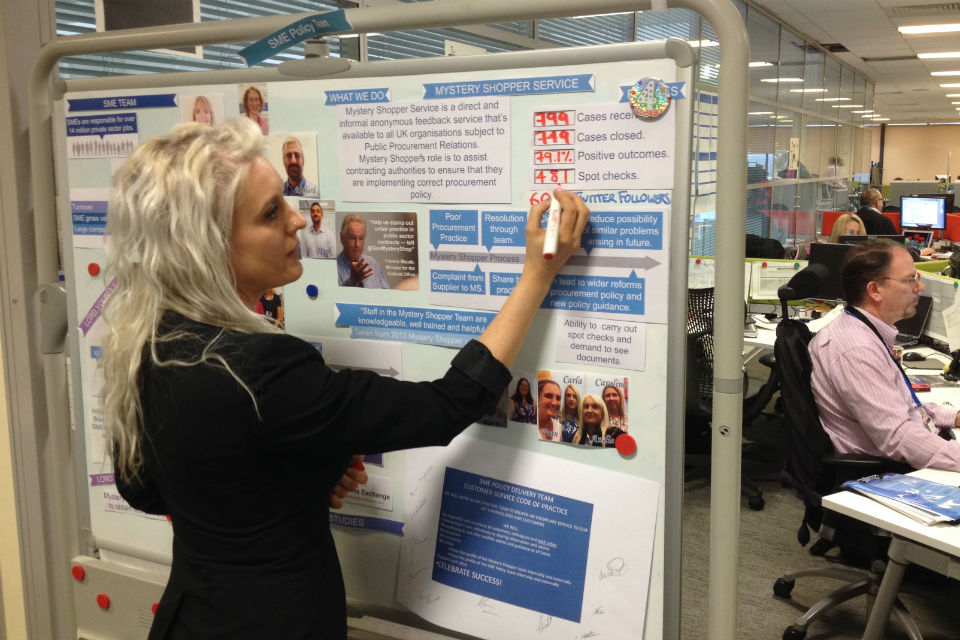
I work for the Mystery Shopper team within the Crown Commercial Service (CCS) – the organisation that manages about £15 billion of the public sector’s buying of common goods and services, mainly everyday items – anything from pens and laptops, to uniforms and agency staff.
Fifteen years ago I started working in our Leeds office, where I looked after suppliers who did building work across the country in hundreds of government-owned buildings. It was my job to check that suppliers had done what they said they’d done and to arrange payments.
Over the years, this kind of work – managing supplier relationships – has morphed into what I do now in the Mystery Shopper team. I’m still looking after suppliers, but it is more to do with what happens if the procurement process goes wrong – we’re the commercial troubleshooters for government.
Rules that exclude
Whatever the public sector has to procure in order to function properly – whether mundane items, such as desks and pens, or more complex things like the computer system that HMRC uses to pay out tax credits, or a new road in a high traffic area – it has to follow rules as part of the buying process, to ensure that competition for government work is fair and that the taxpayer gets the best service and value for money available.
Sometimes, suppliers who want to work with government feel excluded by rules they find confusing and complex, or badly done by in other ways in the procurement process. That’s where the CCS Mystery Shopper team comes in. Suppliers write to us with problems or complaints, about tenders they did not understand or questioning particular procurement practices. We look into these, sort them out wherever we can, to improve practice, and regularly publish the results of our investigations - though only the contracting authority the complaint is against is named, not the Mystery Shopper.

Hard cheese
The range of things we get involved in is bewilderingly varied. In one case, a school wanted a lot of grated cheese to go with their frozen pizza bases – a fair indication of what was on the school dinner menu that week! It came to us because of the amount of paperwork required, which various cheese suppliers didn't feel able to cope with in order to submit their best offers. One wrote to us to complain, and we worked with the school to sort out the problem.
We tend to deal mainly with small businesses doing work across the public sector - from government departments to the NHS, police forces and local councils. We also work closely with industry bodies such as the Federation of Small Businesses.
Not long ago we intervened with a London council to ensure that a small builder could bid for work without having to pay charges to a third-party accreditation service the council wanted them to use. As well as saving the builder money, this helped the council improve its procurement practices.
Waiting for payday
Recently, we also got involved with an NHS Trust to help speed up delayed payments to a supplier. The trust investigated and identified the outstanding invoices, which were processed and the supplier was paid. This is important because often the suppliers who come to us are sole traders. As a sole trader, waiting for payment is like waiting for your wages – it’s no fun wondering when and if you’re going to be paid when you have bills of your own!
We’re not only here to help the suppliers. We collect information on problems from around the country and try to identify any patterns and trends we need to address on a larger scale. Then, we work with other policy teams in the CCS, Cabinet Office and across government to deal with the issues and make improvements in how we buy things.
It’s great to be a part of keeping the country running smoothly, and to feel you are helping to make a difference – by getting value for taxpayers’ money and making things fairer for all businesses, large and small.

2 comments
Comment by Ben posted on
Really enjoyed this article. It's good to see the very wide range of work that the Civil Service does. Thank you
Comment by fatima Ossman posted on
i really enjoyed reading the brief work that happens in Leeds and envy that I wish there was something like that in Dundee and if I could apply and work with the team.
Thank you very much for showing me that there are other parts to HMRC doing things to help both public and us that it's not just being on phones that help run HMRC but have people like you helping too.